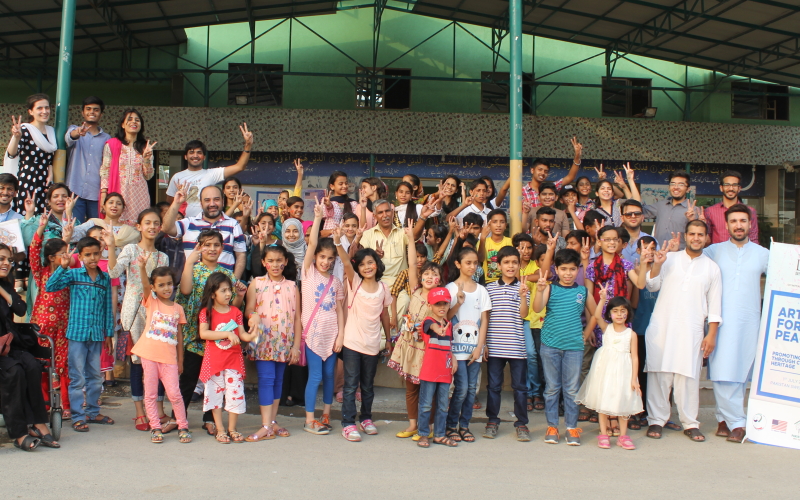By Rimsha Ali Shah
How do you breakdown complexities for young children without overwhelming them? Nurturing sensitized individuals who are attentive to the social realities is critical for a progressive future. Is the answer simply traditional teaching or a more innovative, slightly disruptive, yet equally effective manner? Arts, as a mode of communication, is fast becoming a preferred tool to empower and enlighten children on intricate realities of today’s world.
Raj Kumar, a 23-year old alumnus of the Global Undergraduate Semester Exchange Program from of Umerkot, Tharparker and a member of the minority Hindu population in Pakistan, is committed to fostering interfaith harmony by empowering young minds with the much-needed narrative of co-existence and brotherhood. As part of the State Department’s campaign on Days of Interreligious Youth Action (DIYA), Raj Kumar set off to design a project that addresses this theme through an array of activities under the banner of “Promoting Peace Through Composite Heritage.”

Painting for Peace: Children paint their version of peace
The first event under this project was “Art for Peace” held at Pakistan Sweet Homes, an orphanage in Islamabad, with children from varied walks of life: street children who were students at Master Ayub’s Street School, orphans from Pakistan Sweet Homes, students from SLS Montessori and School and St. Mary’s School, and minorities from the Hindu, Christian and Baha’i communities. This was made possible with the help of $5,000 USD grant from the Pakistan-U.S. Alumni Network. All alumni of various U.S. government sponsored exchange programs in Pakistan are eligible to apply for the grant to enable them to give back to their communities.
Coloring a Peaceful Future

Sketch, color, refine!
Completely engrossed in the magical hues of red, green, and blue, four-year old Angel did not care much for the scorching heat as she was painting her version of peace: home.
Neha and Shamain, on the other hand, were working together: Shamain sketched a sparrow while Neha playfully added colors of her choice. Who said a sparrow could only be grey, after all!
Efraheem Mathew, a psychiatrist associated with the Pontifical Mission, noted the creative response of the children to the theme. “At this age, children are not biased in their opinions of the world. They believe in fairy tales, happy endings and the goodness the world has to offer. Such events help to evoke the humanity and sensitize children on the significance of coexistence, through a tool as playful and engaging as the arts.”

Mentors and young artists discuss what represents peace
A total of 40 young children filled the verandah on Pakistan Sweet Homes, each divided in to groups of five young artists. They were asked to draw anything that meant “peace” for them. The results that came about were not at all stereotypical responses to peace, rather a collection of designs and ideas that showed the sensitivity of the children to the subject. Master Ayub, Pride of Performance award winner who successfully runs a street school in a park in F-6 Islamabad said, “Such events help energize young children, especially when they interact with others from different schools. It boosts their confidence, leads to friendships and learning in ways that we cannot impart through the traditional style of class-room teaching.”
Project lead, Raj viewing the friendships and connections that were being initiated before him commented, “Composite heritage is a true peace connector. Today through the arts, I wanted to empower children here to take shared ownership of the culture and celebrate and respect the diversity around us.”
As the group of 40 posed with victory signs for the camera with peace signs painted on their faces, there was visible a deep-rooted sense of community and brotherhood in the form of new friendships that were untainted by prejudice.
Check out more photographs from the event on our Flickr page.

